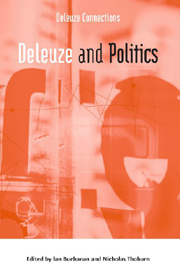Book contents
- Frontmatter
- Contents
- Dedication
- Acknowledgements
- Introduction: Deleuze and Politics
- 1 Power, Theory and Praxis
- 2 Deleuze and the Political Ontology of ‘The Friend’ (philos)
- 3 Molecular Revolutions: The Paradox of Politics in the Work of Gilles Deleuze
- 4 Schizoanalysis, Nomadology, Fascism
- 5 What is a Militant?
- 6 Bourgeois Thermodynamics
- 7 The Age of Cynicism: Deleuze and Guattari on the Production of Subjectivity in Capitalism
- 8 Deleuze, Materialism and Politics
- 9 Becoming-Democratic
- 10 Theorising European Ethnic Politics with Deleuze and Guattari
- 11 People and Fabulation
- 12 Micropolitical Associations
- Notes on Contributors
- Index
Introduction: Deleuze and Politics
Published online by Cambridge University Press: 12 September 2012
- Frontmatter
- Contents
- Dedication
- Acknowledgements
- Introduction: Deleuze and Politics
- 1 Power, Theory and Praxis
- 2 Deleuze and the Political Ontology of ‘The Friend’ (philos)
- 3 Molecular Revolutions: The Paradox of Politics in the Work of Gilles Deleuze
- 4 Schizoanalysis, Nomadology, Fascism
- 5 What is a Militant?
- 6 Bourgeois Thermodynamics
- 7 The Age of Cynicism: Deleuze and Guattari on the Production of Subjectivity in Capitalism
- 8 Deleuze, Materialism and Politics
- 9 Becoming-Democratic
- 10 Theorising European Ethnic Politics with Deleuze and Guattari
- 11 People and Fabulation
- 12 Micropolitical Associations
- Notes on Contributors
- Index
Summary
We have two days to liquidate the legacy of May 1968!
Nicolas SarkozyIt is now a truism of Deleuze studies that it was only after his encounter with Félix Guattari that Deleuze became ‘political’. This is usually taken to mean that Deleuze only became ‘active’ or ‘engaged’ in politics after meeting Guattari, which is untrue. Deleuze was already politically active before he met Guattari – indeed, it isn't difficult to imagine that this was in fact one of the reasons Guattari sought him out in the first place – and, paradoxically enough, he actually seemed to become less active after meeting Guattari, choosing to concentrate on writing and leaving the public side of politics to Guattari. This same narrative is also used in relation to Deleuze's writing, as though to say it wasn't until Anti-Oedipus that Deleuze's work shows any awareness or interest in politics, which again is patently untrue. There is a profound interest in the issue of revolution and political transformation in the cluster of books Deleuze published shortly before he met Guattari, namely his book on Spinoza as well as The Logic of Sense and Difference and Repetition. In these works Deleuze shows himself to be equally against the Leninist or Paulist ‘clean break’ and the more measured ‘reformist’ options of the liberals. Both require that desire subordinate itself to interest. With Guattari, Deleuze would develop the analytic and conceptual means of turning this theme into a political philosophy that has had an enormous influence on a wide variety of disciplines from literary and cultural studies to international relations.
- Type
- Chapter
- Information
- Deleuze and Politics , pp. 1 - 12Publisher: Edinburgh University PressPrint publication year: 2008



